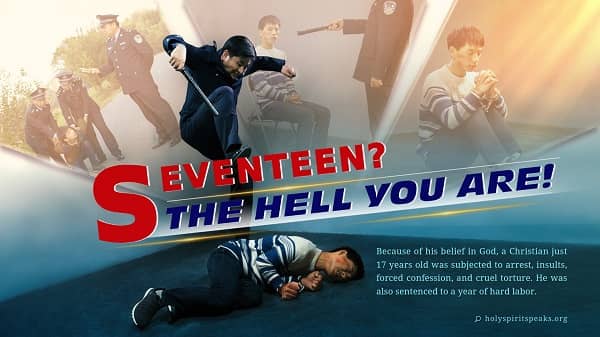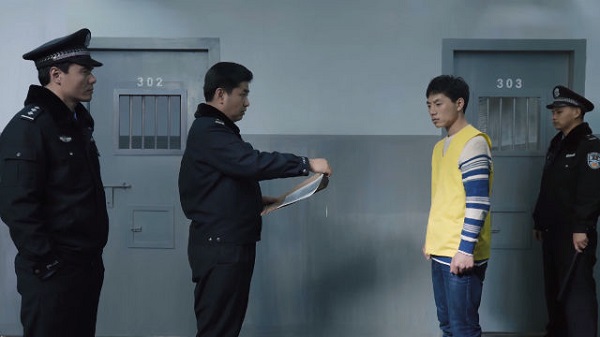Film Review: Seventeen? The Hell You Are!—A Special Present for His Life | Eastern Lightning
✿✨✿✨✿✨✿✨✿✨✿✨✿✨✿✨✿✨ By Yinuo, Japan ✨✿✨✿✨✿✨✿✨✿✨✿✨✿✨✿✨ ✿
The movie “Seventeen? The Hell You Are!” is another documentary recounting the Chinese Communist Party’s cruel persecutions of Christians. The experience of the hero is so true and moving that I like this movie and shed tears several times. In the film, we can see not only that the CCP uses cruel and inhumane tortures on Christians, but also the true growth process of a young Christian’s life. He is like a young pine tree, which withstands the chill of winter, and flourishes in the warmth of springtime.This movie, though without many artistic techniques, is based on a good and touching story:
A seventeen-year-old Christian was on his way home from preaching the gospelwhen he was arrested by the CCP police, and then he suffered cruel torture, and in the end was forcibly sentenced to a year of reform through labor. Had this occurred in the western democratic countries which place much emphasis on the freedom of religion and the protection of minors, it would surely have been the top news. According to people’s imaginations, no matter how the CCP persecutes Christians, they will not lay their murderous hands on a seventeen-year-old boy. However, this movie allows us to see the baseness and evil of the CCP more thoroughly. The movie title, “Seventeen? The Hell You Are!”, figuratively expresses the CCP’s hatred of God, and foreshadows the CCP’s inhuman and brutal persecution of Christians. It can be seen that they won’t let go of one Christian regardless of age!
A seventeen-year-old Christian was on his way home from preaching the gospelwhen he was arrested by the CCP police, and then he suffered cruel torture, and in the end was forcibly sentenced to a year of reform through labor. Had this occurred in the western democratic countries which place much emphasis on the freedom of religion and the protection of minors, it would surely have been the top news. According to people’s imaginations, no matter how the CCP persecutes Christians, they will not lay their murderous hands on a seventeen-year-old boy. However, this movie allows us to see the baseness and evil of the CCP more thoroughly. The movie title, “Seventeen? The Hell You Are!”, figuratively expresses the CCP’s hatred of God, and foreshadows the CCP’s inhuman and brutal persecution of Christians. It can be seen that they won’t let go of one Christian regardless of age!
 |
| picture of the Church of Almighty God |
The hero Gao Liang, a seventeen-year-old high school student, followed his parents in believing in God from childhood. He is very pure and yearns for justice. In the beginning, when his parents warns him to pay attention to safety in preaching the gospel, his idea is very simple—he is just a child, so, even if he is arrested by the CCP, they won’t do anything to him. A little naïve and puerile, such thoughts do match the psychology of a simple and unsophisticated youngster. Therefore, after being captured, at first he embraces fantasies and impulsively reasons with the police that they shouldn’t have arrested them, because believing in God is the righteous thing. But as a result, he is beaten up by the police. After he and Uncle Liu are both knocked to the ground, he sees that while being beaten, Uncle Liu just keeps silent with closed eyes, clasping his hands and praying. Then he prays to God silently in his heart as well. This subjective camera shows the change in his mind. He comes to realize that reasoning with the police is just in vain, because they do not really serve the people, but specialize in persecute Christians. Nevertheless, when Chief Zhao comes and preaches him with atheism and evolutionism, he still embraces a thread of fantasy—those underlings cannot understand what he says, but the officer should be able to. But the result is that he suffers much crueler tortures. For a juvenile who is just in the prime of youth, it is quite unbearable, both spiritually and physically, to be relentlessly shocked with the electric batons on the face, four limbs, and even lower area.
The hero Gao Liang’s feelings surge and erupt in the scene where he stays with Uncle Liu in the holding cell. The shots of Gao Liang shedding tears three times do touch people’s hearts. In the darkness of night, Gao Liang is in a trance. Though he has had some discernment of the CCP’s evil through the cruel torture in the daytime, yet at the very thought that he may be tortured again the next day, his heart is filled with dread and he sheds tears of grievance at this moment. Uncle Liu’s words of encouragement and consolation make him begin to reflect why he has encountered this environment. When he understands it is God’s trial and he should stand in testimony for Him, he faces forward and sheds tears again. In appearance, it seems that he is speaking to Uncle Liu, but actually he is making a solemn oath to God from his heart. The tears he sheds for being encouraged represents his resolution to stand witness for God. When the police man shouts at them, not allowing them to talk, his eyes sparkle with tears because he has understood a little of God’s will and his heart is comforted and moved. Through the detailed portrayal of the character’s thrice shedding tears, the change of Gao Liang’s ideas and emotions is well shown.
 |
picture of the Church of Almighty God | “Seventeen? Christians" |
God said: “And I will bring the third part through the fire, and will refine them as silver is refined, and will try them as gold is tried” (Zechariah 13:9). The faith of Christians should be constantly tested to get purified; this conviction is also what this film conveys to us. In the detention house, when a prisoner snatches the steamed bread from Gao Liang’s hand and stamps on it, the actor gives full expression to his mixed feelings—the look in his eyes reveals his astonishment, anger but helplessness. The series of inhuman treatment he undergoes in the detention house break down his faith gradually. But through Uncle Liu’s support and help, he stands up bit by bit. Finally, Gao Liang pulls through it and can discern the CCP’s evil even better.
At this point, there is a great plot twist. When Gao Liang and Uncle Liu are punished to stand watch at night, Uncle Liu suffers a heart attack and falls down. Without a doubt, this does give Gao Liang a head-on blow. In his heart, he has long before regarded Uncle Liu as his reliance. Facing the fall of the pillar, Gao Liang feels afraid, as well as being concerned about Uncle Liu, so by instinct, he cries: “Help!” The following empty scene of the corridor in the darkness skillfully reflects his desolate and helpless mood. After half-a-month of long waiting, Gao Liang doesn’t see Uncle Liu’s return but instead receives a written decision which says that he is sentenced to one year of reeducation through labor. This is, no doubt, another sudden blow to him. Under the double blow that has fallen on him, Gao Liang breaks down completely. At this point, the director aims, through the use of slow motion and close-up, to reveal and highlight the character’s inner pain and despair, and well conveys this emotion to audience through the shot. We cannot but become concerned about whether this juvenile is able to stand it. What is in sharp contrast to Gao Liang’s pain is the smug and aggressive manner in which Chen Ming shows Gao Liang the written decision and says, “Even if you don’t say a single word, we can sentence you as well.” On the surface, Gao Liang is sentenced to one year of reeducation through labor, losing his personal freedom, so it seems that the CCP has succeeded. But in the spiritual realm, the CCP is the loser. Weak though Gao Liang is, he does not betray God, but stands firm in his testimony. The CCP is concealing its anger at this shameful failure behind the aggressive and rampant appearance. This really fulfills the saying: “Those whom God wishes to destroy, He first makes mad.”
 |
picture of the Church of Almighty God | “Seventeen? Christians" |
God’s grace is always hidden in tribulation. Accompanied by the soaring lyrical song “All the Way in Your Company,” the narrative lyrics match perfectly a hodgepodge of shots of Gao Liang’s one-year life in the labor camp. The director uses these typical shots of Gao Liang to convey an important information: No matter what tribulation or trial we encounter, God is always with us silently, never leaving us. Then, a soft focus lens is used to when Gao Liang unloads the heavy gunnysack from his shoulder and stands in the afterglow of the sunset, looking ahead. It implies the process of transformation of the hero’s life: In the beginning he is refined and oppressed in spirit, but afterward he is able to set aside the load in his heart, learns to pray to and rely on God in tribulation, and is released in spirit. When Gao Liang walks out of the gate of labor camp, his first words “Oh God, I thank You!” do impress people deeply. These few words are of great weight. They contain all the joys and sorrows of this year. Though passing through the valley of weeping and suffering pains, he feels sweet in the company of God.
This movie provides us with many enlightenments. In terms of human rights, the CCP’s disregarding human rights and its atrocities to cruelly persecute Christians are really hateful. In terms of spiritual experience, if a Christian wants to grow in life, he should experience many trials and tribulations. Just like Job, after going through the trials, he had true faith in God and real obedience to Him. This is the most precious treasure in life. Take another example. David defeated the giant Goliath in his early youth, yet on account of his battle achievements, he was envied and thus hunted by Saul. However, David did not complain about God but still trusted in Him and wrote many hymns that praise Him. There’s also Joseph. At the age of seventeen, he was sold to be a slave in Egypt by his elder brothers. Though he was put into prison and subjected to great hardship, he never blamed God for this. In the end, he became the governor of Egypt, in charge of all of Egypt’s affairs. From all above, we can see that when God perfects someone, He does not care about his age, but cares whether his heart is honest and obedient.
At the age of seventeen, Gao Liang received the special present bestowed by God and his life began to grow and mature. And what about us? In our life, we also constantly encounter many people, matters, objects and environments which are not in line with our conceptions, and we are often weak and negative or even harbor complaints in our hearts. However, at this moment, never forget that God is by our side all along and accompanies us in our growth. He has never gone away. What we need to do is to return to God, pray to and rely on Him with our hearts, and learn to wait, seek, and submit. In this way, He will surely lead us to walk out of the valley of weeping and we shall then welcome the springtime of life!
2 comments:
Amen
All the glory be to almighty God
Post a Comment